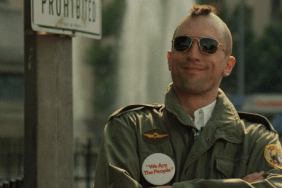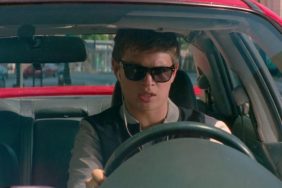
In this ongoing SHOCK column, editor Chris Alexander tells tales and muses on classic and contemporary cult cinema and music.

There was a television show – if you could even call it a show – on Canadian TV when I was a kid called NIGHT RIDE. The program (which I believe aired on the Global Network) was simply a camera hooked up to the interior of a moving car, one that drove down and around the half-dead Toronto city streets, well after hours, while moody jazz purred on the soundtrack (incidentally, a sister show also aired called NIGHT WALK was just that, a POV journey of someone walking the streets, riding escalators, riding busses etc).
The program was one of those great space-fillers that stations used to produce to keep insomniacs tuned in. Of course, no one does that anymore. Now, cable stations will simply roll out infomercials to pay for the near-dead air. But back then, things were still on the edge of experimental and NIGHT DRIVE was one of the last bastions of just-before-dawn, cathode ray-designed beauty.
I mention this show because, as a teen, I was hooked on it. Id come in late from wherever I was and just let the show drown me to sleep. Sometimes I was in the cups, which made the experience all that more surreal. But whether drunk or sober, there was a haunting, comforting yet unsettling quality about simply moving through the streets, moving around when I knew I should have been asleep. Something dream-like about seeing street lights and neon reflected in puddles. Of seeing 24-hour pizza parlor employees staring out windows, waiting for the sun to rise and their shift to end so they could go God knows where. There was something lonely about it all. Something almost sinister. Something very wrong.
Yes there was a feeling that something was just not right.
Like, whoever was driving us around was looking for something he or she would never find and Heaven help us if they did find it…
It was with those solo nights watching NIGHT RIDE ingrained hard into me that I finally found Martin Scorseses 1976 psychodrama TAXI DRIVER, a film that was the obvious aesthetic inspiration for NIGHT RIDE, a film that put a face to the lonely driver steering that wheel.
Travis Bickle.
By the time I caught up with TAXI DRIVER, it was already mythical. I had read much about its import. I had read about its darkness and heard much about how startling Robert De Niros personification of Bickle was. And how stylish a cinema-slinger Scorsese was.
And it was all true. TAXI DRIVER hypnotized me then. It still does. I watch it once a week. Sometimes Ill leave it on repeat and just let it go. TAXI DRIVER is not just a movie, its an environment, both internal and external.
But what really grabbed me and continues to move me about the film was the music.
The final score by Hitchcocks right-hand music man, Bernard Herrmann.
The music was the aural manifestation of the danger, sensuality and oozing allure of the streets, after dark, a world that keeps pulling Bickle deeper into his own Night Ride.
That beautiful, masterful music.
By 1975, Herrmann was not in the best health. Aged and ailing, he had done wonders elevating Larry Cohens terrifying 1974 mutant baby masterpiece ITS ALIVE to a kind of high art, with urgent, brass-fueled music that made the modest movie seem positively epic. But outside of that picture, Herrmann was in virtual retirement.
Enter Scorsese.
The story goes that Scorsese virtually begged Herrmann to do TAXI DRIVER. The composer initially refused. But Marty was persistent. He pushed for a meeting and, after sending Herrmann the script, managed to chip away at the composers resistance, bit by bit.
Eventually he got his meeting. And Herrmann, sickly and tired, agreed. Apparently it was the scene in the script where Bickle puts brandy on his cereal that ultimately sold him.
TAXI DRIVER would be Herrmanns final film score. Though he appeared on set during the making of the picture on occasion, his decline was evident and, reportedly, on the final day of mixing, he went home, lay down and just died.
A quiet end to a thundering career.
But an appropriate one really, in respect to the slow-burning deathdream he was sculpting sound for.
Herrmanns TAXI DRIVER score is indeed a work of meticulously crafted art, dread-fueled and labored of breath, swelling, almost climaxing in a peak of anxiety and violence, before gently ebbing, receding; horns yawning, accelerating percussion and that ascending/descending string section that would employ so lushly in so many amazing films.
It moves like Bickles eyeballs do: scanning, searching left, center, right searching searching for something it will never find.
It has moments of beauty steeped in something almost hard-boiled, with near-sexual saxophone solos tempered by spare piano key strikes. Its alternately evil, world weary, predatory and still somehow innocent.
Its the sound of a man losing his grip on anything good. And it was the sound of Herrmann saying goodbye to his life and his art. Because he knew he was dying. And with Herrmann, you simply left him alone and trusted he would deliver exactly what you needed. Not necessarily what you wanted. What you NEEDED.
So, Herrmanns music was personal. It was him accentuating his directors vision but it was also about him saying something directly to the audience.
And with TAXI DRIVER, he was writing the score for his own funeral.
I have the TAXI DRIVER soundtrack. A well-worn CD release on the Arista label, given to me, oddly enough, by SHOCK contributor John Nicol, who just spoke about Herrmann in his composer listicle this morning.
On my darkest nights of the soul, I get into my car, after everyone is asleep and dreaming and I spin that CD. I drive into the city. I listen. I search.
And I do my own Night Ride.
Just me.
And Bernie
Gods Lonely Men.









